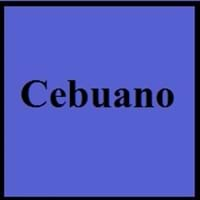Malagasy and Cebuano
Countries
Madagascar
Philippines
National Language
Comoros, Madagascar, Mayotte
Philippines
Second Language
Not spoken in any of the countries
Philippines
Speaking Continents
Africa
Asia
Minority Language
Not spoken in any of the countries
Not spoken in any of the countries
Regulated By
Not Available
Visayan Academy of Arts and Letters
Interesting Facts
- Malagasy language was originated in southeast Asia, since it shares several common words and meanings with Indonesian Languages.
- About 93% of the basic vocabulary is of Malayo-Polynesian origin in Malagasy language.
- About one-fifth of the population of the philippines speak cebuano and are second largest ethnolinguistic group in the country.
- Cebuano contains many words of Spanish origin.
Similar To
Not Available
Hiligaynon Language
Derived From
Not Available
Island of Cebu
Alphabets in
Malagasy-Alphabets.jpg#200
Cebuano-Alphabets.jpg#200
Writing Direction
Not Available
Not Available
Time Taken to Learn
Not Available
Thank You
Misaotra
Salamat
How Are You?
Manao ahoana!
Kumusta man ka?
Good Night
Alina tsara
Maayong Gabii
Good Evening
Manao ahoana e
Maayong Gabii
Good Afternoon
Manao ahoana e
Maayong Hapon
Good Morning
Maraina tsara
Maayong Buntag
Sorry
Miala tsiny
Ikasubo ko
I Love You
Tiako ianao.
Gihigugma ko ikaw
Excuse Me
Azafady
Ekskyus mi
Dialect 1
Eastern Malagasy
Boholano
Where They Speak
Merina
Bohol
How Many People Speak
Not Available
Dialect 2
Western Malagasy
Southern Kana
Where They Speak
Sakalava
southern Leyte
How Many People Speak
Not Available
Dialect 3
Not Available
North Kana
Where They Speak
Not Available
northern part of Leyte
How Many People Speak?
Not Available
Not Available
Second Language Speakers
Not Available
Native Name
Fiteny Malagasy
Visayan
Alternative Names
Malagasy Sign Language
Binisaya, Bisayan, Sebuano, Sugbuanon, Sugbuhanon, Visayan
French Name
malgache
cebuano
German Name
Malagassi-Sprache
Cebuano
Pronunciation
Not Available
Not Available
Ethnicity
Malagasy people
Cebuano people
Origin
1000 AD
16th century
Language Family
Austronesian Family
Austronesian Family
Subgroup
Austronesian
Not Available
Branch
Indonesian
Not Available
Early Forms
No early forms
No early forms
Standard Forms
standard Malagasy
Standard Cebuano
Signed Forms
Not Available
Not Available
Scope
Macrolanguage
Individual
ISO 639 1
mg
No data Available
ISO 639 6
Not Available
Not Available
Glottocode
mala1537
cebu1242
Linguasphere
No data available
No data Available
Language Type
Living
Living
Language Linguistic Typology
Verb-Object-Subject
Verb-Subject-Object
Language Morphological Typology
Not Available
Not Available
All Malagasy and Cebuano Dialects
Most languages have dialects where each dialect differ from other dialect with respect to grammar and vocabulary. Here you will get to know all Malagasy and Cebuano dialects. Various dialects of Malagasy and Cebuano language differ in their pronunciations and words. Dialects of Malagasy are spoken in different Malagasy Speaking Countries whereas Cebuano Dialects are spoken in different Cebuano speaking countries. Also the number of people speaking Malagasy vs Cebuano Dialects varies from few thousands to many millions. Some of the Malagasy dialects include: Eastern Malagasy, Western Malagasy. Cebuano dialects include: Boholano , Southern Kana. Also learn about dialects in South American Languages and North American Languages.
Malagasy and Cebuano Speaking population
Malagasy and Cebuano speaking population is one of the factors based on which Malagasy and Cebuano languages can be compared. The total count of Malagasy and Cebuano Speaking population in percentage is also given. The percentage of people speaking Malagasy language is 0.28 % whereas the percentage of people speaking Cebuano language is 0.32 %. When we compare the speaking population of any two languages we get to know which of two languages is more popular. Find more details about how many people speak Malagasy and Cebuano on Malagasy vs Cebuano where you will get native speakers, speaking population in percentage and native names.
Malagasy and Cebuano Language Codes
Malagasy and Cebuano language codes are used in those applications where using language names are tedious. Malagasy and Cebuano Language Codes include all the international language codes, glottocodes and linguasphere.





